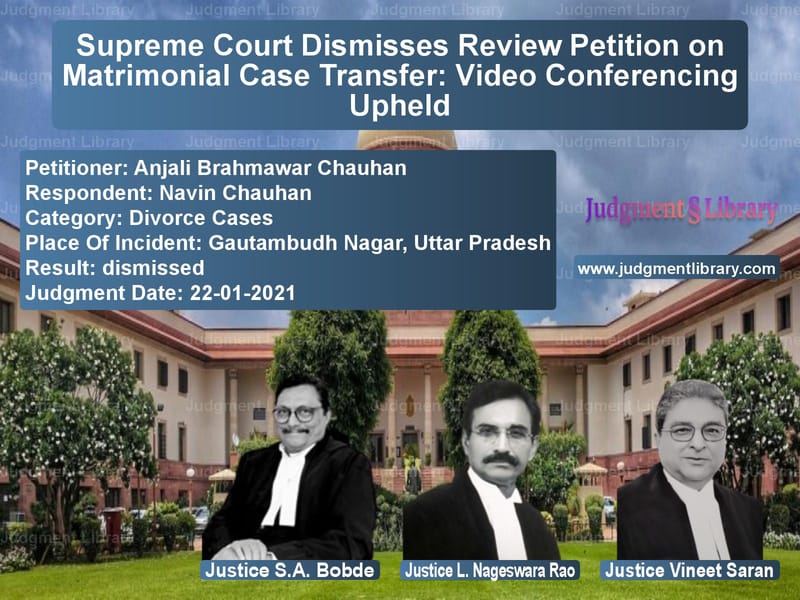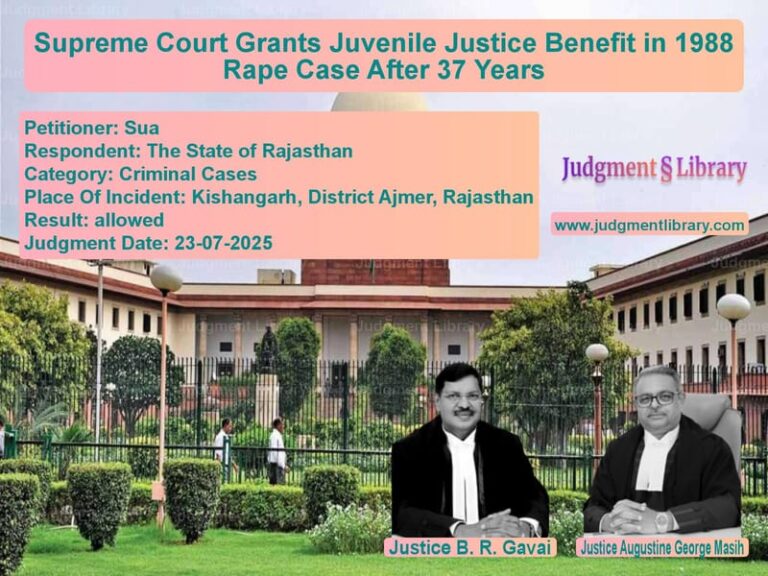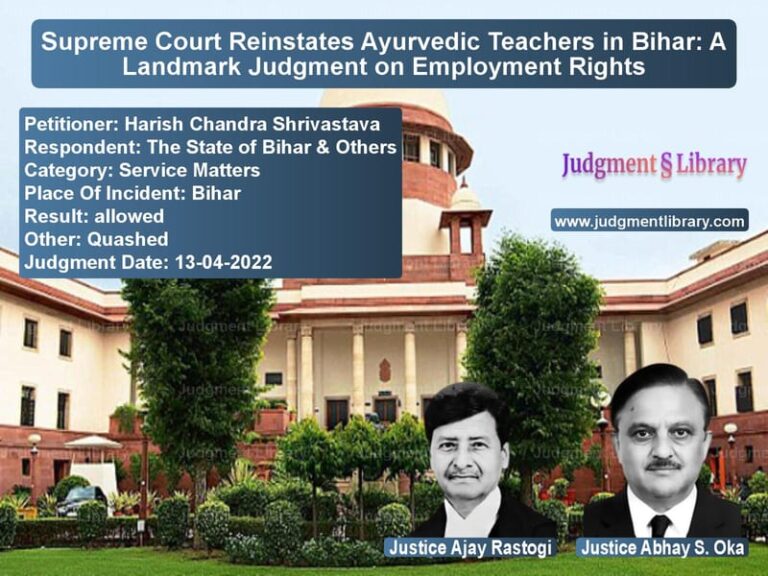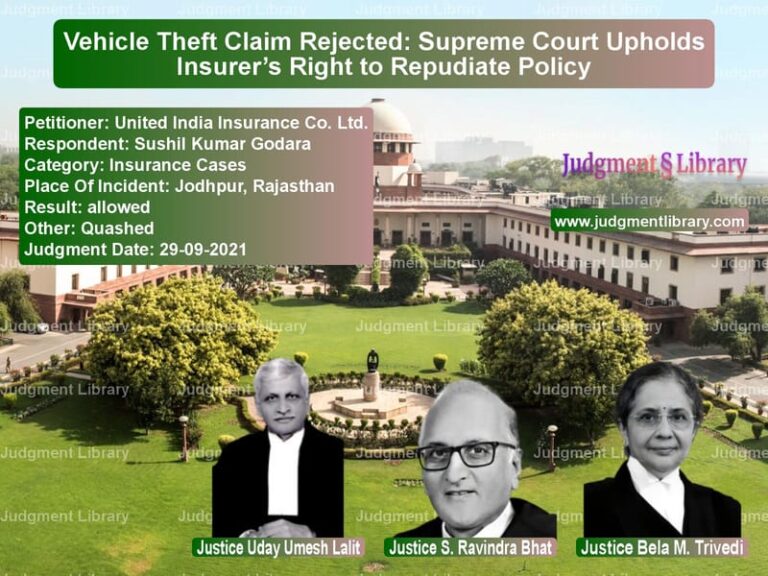Supreme Court Dismisses Review Petition on Matrimonial Case Transfer: Video Conferencing Upheld
The Supreme Court of India recently dismissed a review petition filed by Anjali Brahmawar Chauhan in the case of Anjali Brahmawar Chauhan vs. Navin Chauhan. The petitioner had earlier sought a transfer of the matrimonial case from the Family Court at Gautambudh Nagar, Uttar Pradesh, to the Family Court at Saket, New Delhi. The primary ground for seeking transfer was the inconvenience caused by traveling between the two locations.
The Supreme Court had initially dismissed the transfer petition, stating that no serious inconvenience would be caused to the petitioner by traveling between Gautambudh Nagar and New Delhi. However, the Court had permitted the trial proceedings to be conducted through video conferencing to ease the burden on the petitioner.
Background of the Case
The petitioner, Anjali Brahmawar Chauhan, had filed Transfer Petition (C) No. 1252 of 2016 to shift her matrimonial case from Gautambudh Nagar to Saket, New Delhi. She argued that traveling frequently for court proceedings would cause undue hardship.
However, the Supreme Court, while dismissing the transfer petition, directed that the trial be conducted via video conferencing. The Court’s decision was based on the assumption that video conferencing facilities were available at the Family Court, Gautambudh Nagar.
The petitioner subsequently filed Review Petition (C) No. 472 of 2018, challenging the decision on two key grounds:
- There was no video conferencing facility available at the Family Court, Gautambudh Nagar.
- The Supreme Court, in the case of Santhini vs. Vijaya Venketesh (decided on 09.10.2017), had ruled that video conferencing was not permissible in matrimonial cases.
Petitioner’s Arguments
- The petitioner contended that the order permitting video conferencing was impractical since the required technology was not available at the designated court.
- She also relied on the precedent set in Santhini vs. Vijaya Venketesh, arguing that conducting matrimonial proceedings via video conferencing was legally impermissible.
- Given these factors, she requested the Court to reconsider its decision and transfer the case to Saket, New Delhi.
Respondent’s Arguments
- The respondent opposed the transfer, asserting that the distance between Gautambudh Nagar and Saket, New Delhi, was not significant enough to warrant a case transfer.
- The respondent’s counsel pointed out that the Supreme Court had already addressed the issue and had provided a reasonable alternative by allowing video conferencing.
- It was also argued that the current pandemic situation had led to the adoption of virtual hearings across all courts, making video conferencing a viable option.
Supreme Court’s Observations
Chief Justice S.A. Bobde, along with Justices L. Nageswara Rao and Vineet Saran, delivered the judgment dismissing the review petition. The Court made the following key observations:
“In the normal course, we would not have directed video conferencing in respect of matrimonial matters as per the judgment of this Court mentioned above. However, in the present situation where all proceedings are conducted through video conferencing, we direct the Family Court, District Gautambudh Nagar, U.P., to conduct the trial through video conferencing.”
The Court acknowledged the ruling in Santhini vs. Vijaya Venketesh but held that the prevailing pandemic situation required a flexible approach. Given that courts across the country were functioning through virtual hearings, the Court found no reason to reconsider its earlier order.
Final Judgment
The Supreme Court dismissed the review petition, upholding its earlier decision. The Court reiterated that the trial proceedings should continue through video conferencing at the Family Court in Gautambudh Nagar. It also directed that appropriate technical arrangements be made if video conferencing facilities were not already in place.
Conclusion
This judgment reaffirms the judiciary’s adaptability in times of crisis and underscores the increasing reliance on digital solutions in legal proceedings. While matrimonial matters are traditionally handled in person, the Court recognized the necessity of video conferencing during the pandemic. The ruling also serves as a reminder that convenience alone is not a sufficient ground for transferring cases, especially when alternative solutions are available.
Petitioner Name: Anjali Brahmawar Chauhan.Respondent Name: Navin Chauhan.Judgment By: Justice S.A. Bobde, Justice L. Nageswara Rao, Justice Vineet Saran.Place Of Incident: Gautambudh Nagar, Uttar Pradesh.Judgment Date: 22-01-2021.
Don’t miss out on the full details! Download the complete judgment in PDF format below and gain valuable insights instantly!
Download Judgment: anjali-brahmawar-cha-vs-navin-chauhan-supreme-court-of-india-judgment-dated-22-01-2021.pdf
Directly Download Judgment: Directly download this Judgment
See all petitions in Child Custody
See all petitions in Mutual Consent Divorce
See all petitions in Divorce by Desertion
See all petitions in Judgment by S. A. Bobde
See all petitions in Judgment by L. Nageswara Rao
See all petitions in Judgment by Vineet Saran
See all petitions in dismissed
See all petitions in supreme court of India judgments January 2021
See all petitions in 2021 judgments
See all posts in Divorce Cases Category
See all allowed petitions in Divorce Cases Category
See all Dismissed petitions in Divorce Cases Category
See all partially allowed petitions in Divorce Cases Category







